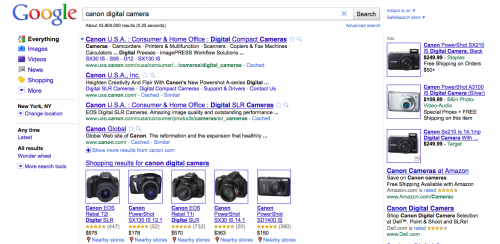Google Partner Brings Big Data To Product Search
Google has famously undertaken a high-profile initiative to show users where they can buy products offline in local stores. It has also launched a very non-traditional (for Google) shopping site, Boutiques.com. There have been additional improvements in the Google Product Search destination site, including more product-browse capabilities. Then there are product listing ads, which expanded […]
Google has famously undertaken a high-profile initiative to show users where they can buy products offline in local stores. It has also launched a very non-traditional (for Google) shopping site, Boutiques.com. There have been additional improvements in the Google Product Search destination site, including more product-browse capabilities. Then there are product listing ads, which expanded to all US advertisers last November.
In other words, across the board in product search/discovery and product-related advertising, there’s considerable activity going on at Google. You can now add to all that a new push for more complete and accurate product data through a partnership with a company called Edgenet.
Edgenet manages data feeds from product suppliers and distributors, as well as retailers. I had never heard of the company before but I would now put it on the Google acquisition watch list. Here’s how Edgenet describes the benefits of the new Google relationship itself:
This represents the first time that suppliers will have the ability to provide product data to Google and have it checked for quality and represents a unique opportunity to differentiate a supplier from their competition . . . Products found online have an average of seven attributes for shoppers to discover. Product data from Edgenet’s Ezeedata service have an average of over 100 features and greater marketability…
This deal is about getting more product data directly from their sources and expanding the number of specific attributes or features exposed to consumers (“long tail”). Google pointed in its blog post about the new relationship to a product page as the place where the new/better data will show up:
It immediately makes me think about SEO and wonder how the improved data and product pages might show up in search results. Here’s what a search results page for “Canon digital camera” looks like today:
The Google Product Search images in the center of the page are pretty powerful and eye-catching. So are the product listing ads on the right.
Aside from the inventory data I see a very strong analogy between Product Search and Local at Google, with improved product pages (like Place Pages) becoming a strong or “go to” source of product information for consumers. In addition, the prominence of product images and local availability information in search results will likely mean more product-related traffic heading over to Google Product Search just as more “page 2” local business lookups are being captured by Google Maps and Place Pages.
Companies such as Amazon or Target, with strong brands, may be immune or resistant to the rise of Google Product Search but the many no-name e-commerce sellers relying on optimized product pages for SEO may find it harder to get organic traffic from Google and may need to increasingly look to product listing ads for exposure. The old game of traffic arbitrage, played so well for so long by shopping comparison engines, may also soon be coming to a close.
Related posts:
Contributing authors are invited to create content for Search Engine Land and are chosen for their expertise and contribution to the search community. Our contributors work under the oversight of the editorial staff and contributions are checked for quality and relevance to our readers. Search Engine Land is owned by Semrush. Contributor was not asked to make any direct or indirect mentions of Semrush. The opinions they express are their own.




